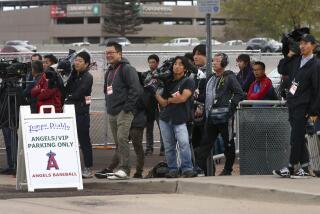Japan Will Beef Up Insider Trading Laws : Officials Deny Problem Exists; Critics Claim Practice Is Rampant
- Share via
TOKYO — Depending on who you talk to, insider trading is rampant--or nonexistent--in Japan. In either case, authorities are now taking steps to ensure that investors here understand that trading stocks on confidential information is not acceptable.
An advisory committee to the Ministry of Finance is scheduled to unveil today a proposal to revise Japan’s securities laws to that end. If approved by Parliament later this year, as expected, the new law would expand and clarify the definition of insider trading and provide criminal penalties for those prosecuted and convicted.
The revisions, on paper, bring Japan roughly into line with other advanced capitalist states, which bar insider trading and, to varying degrees, actively prosecute it. So far, not a single case of insider trading has been taken to criminal court in Japan, although postwar Japanese securities laws were modeled after those of the United States.
Finance Ministry officials say no offenders have been prosecuted because insider trading does not really occur in Japan as it does in the West, where the hostile takeover bids that give insider traders their most valuable opportunities are far more frequent. As a result, Japan lacks precedents in case law and the statutory regulations that give teeth to the U.S. Securities and Exchange Commission.
Critics, however, charge that the ministry not only is ill-equipped to enforce the law, it has no interest in doing so, despite clear signs of widespread trading abuse. Unless an official philosophy of passive market regulation changes, they say, the revised law will have little effect in discouraging insider trading.
“The Finance Ministry basically has no desire to do anything about securities fraud,” said Seijiro Watanabe, a former district prosecutor who now specializes in securities fraud as a private lawyer. “If they wanted to, they could prosecute insider trading under the existing law.”
Shigeru Kobayashi, a special officer in the Finance Ministry’s securities bureau, said the revisions are aimed at “creating an environment in which insider trading won’t occur” once Japan’s stock markets become more fully integrated with other global financial centers. “We’re concerned that hostile takeovers will be common in Japan someday, too.”
The regulatory systems in force in Japan and the United States are so different, Kobayashi said, that enforcement activities cannot be compared. Japanese authorities carefully screen and license financial institutions, then police them through administrative guidance, he said. U.S. authorities aggressively prosecute violations after the fact in a more loosely controlled market.
The ministry resolved to reform the law on insider trading last September, following a controversy in which a bank in western Japan sold shares in a company that it allegedly knew was in financial crisis.
Hanshin Sogo Bank admitted selling 337,000 shares in Tateho Chemical Industries the day before the company, which had borrowed from Hanshin Sogo, publicly disclosed that it faced bankruptcy after losing about $200 million in the Tokyo bond futures market.
But the bank was cleared of insider trading allegations in administrative investigations by the Osaka Stock Exchange, where the transactions occurred, and later by the Finance Ministry. Kobayashi declined to say whether evidence gathered at that time might have warranted a criminal investigation under the proposed law.
Administrative Guidance
In fact, he says, the ministry, which employs 600 bureaucrats in market surveillance, compared to 2,000 with the SEC in the United States, has no intention of ever investigating suspicious trading for the purposes of initiating a criminal indictment.
“Our job is strictly administrative guidance,” he says.
It remains up to district prosecutors to decide whether to take criminal action, but how they would learn of suspected abuses is not clear. The ministry’s administrative guidance will continue to be confidential.
Individuals can file criminal complaints, which is what Watanabe, the Tokyo securities lawyer, plans to do.
Watanabe said he will file a fraud complaint with the Tokyo district prosecutors office next month, suing six Hanshin Sogo executives on behalf of alleged victims in the stock sale. He hopes this will trigger Japan’s first criminal investigation of insider trading, even before the law is revised. Prosecutors have not said publicly whether they are interested in taking up the case.
Has Criminal Penalties
Specifically, the ministry proposes revising Section 189 of Japan’s Securities and Exchange Law so that the prohibition of insider trading applies to anyone with confidential information gained from a listed company or a related financial institution or government official. Under the current law, only officers of the listed company or shareholders with more than 10% of outstanding shares are covered.
Criminal penalties would apply, resulting possibly in heavy fines and imprisonment, the extent of which has yet to be determined. The worst penalty a court can impose under the current civil procedure is to force the offender to return trading profits to shareholders of the listed company. That has happened only once in nearly 40 years, Kobayashi said.
Meanwhile, many securities analysts say the concept of insider trading retains a somewhat ambiguous--but honorable--status in Japan. To hardened stock speculators, it can be considered the basis of a clever investment. But that attitude may be changing as Japan is forced to adopt global standards.
“It’s a new era of internationalism,” says Hiroshi Kurihara, managing director of the Japan Securities Dealers Assn. “We’ll have to change our perceptions of what insider trading is. This new law makes that very clear.”
More to Read
Sign up for Essential California
The most important California stories and recommendations in your inbox every morning.
You may occasionally receive promotional content from the Los Angeles Times.










